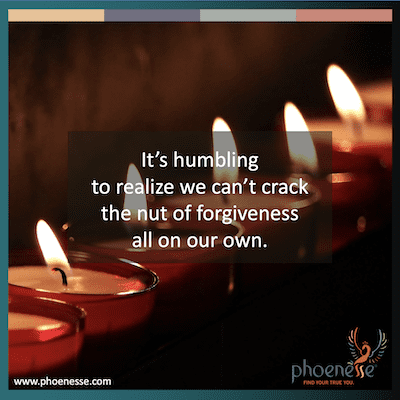
It’s humbling to realize we can’t crack the nut of forgiveness all on our own.
Resentments are notorious for driving huge wedges between otherwise peace-loving people. Often, our work must start with our willingness to see our part, which will lead us to making amends for our wrongdoings. It can be humbling, in a healthy and healing way, to ask for forgiveness for our faults and misunderstandings.
Yet typically the tougher nut to crack is to be on the other side, to be the one doing the forgiving. Forgiveness is so hard, in fact, the Lord’s Prayer makes special mention of it: Forgive us our trespasses, as we forgive those who trespass against us.
Turns out, we all need help on this one. If we could forgive all on our own using the power of our will alone, we wouldn’t need to pray for help. Like, for example, there’s nothing in the Lord’s Prayer about asking for help moving from Point A to Point B because we have legs we can move at will. But forgiveness, that we must ask for help with.
When someone asked the Guide how we should react when someone gossips about us behind our back, the Guide said, “You all know the answer is to forgive.” But, he goes on to say, is that really what we typically do? Naw. We might tell ourselves helpful mantras—“Like water off a ducks back!”—but underneath, we go on fuming. Too often, we will carry around this burden, harming ourselves far more than anyone else.
What would be less harmful is to admit we’re still peeved. But in truth, we bristle at the notion we’re not yet perfect and so we pretend we are further along than we are. Self-honesty, then, must really be our first step.
Praying for help
We can start by comparing our actual feelings with the more true course we know to be right. If we won’t take this step, we won’t get very far. Then we can pray, asking God to help open our eyes to what’s possible: namely, to forgive wholeheartedly.
One tip that is highly counterintuitive but which can work wonders is to pray for the person we can’t—or won’t—forgive. We don’t have to leap to full immersion on this right away. Sometimes it helps to pray to be willing. Or when necessary, we can pray to be willing to be willing, which can make for a very good start.
Utter self-honesty will light our way.
We can also ask ourselves: “Do I really want to forgive?” Pay attention to the part that enjoys not forgiving. We get a big hit of negative energy off our resentments, and if we can recognize that this is what’s driving us, we can then ask: “Is this what I really want, to keep running on hate?”
If we can see that this is what we’re doing, we have a huge clue about the truth of our Lower Self. And this awareness is priceless. While we can’t take this information to the bank, we can take it straight to the Father and ask for help. This is humbling, the realization that we can’t crack this nut of forgiveness all on our own. But with a shovel of goodwill and a bucket of stick-to-it-iveness, we can heal this divide. Utter self-honesty will light our way.
Cause and effect always prevails
Here’s another thing that’s equally important, not just for forgiveness but for self-development in general: The realization that nothing ever happens that’s not based on the Law of Cause and Effect. This doesn’t make the other person right, nor does it justify their behavior. Heck, their wrong might be way greater than our own.
But know this: If there is disharmony in our lives, there must be something in us that at one time or another contributed to it. We’ve got some wrong current, some misguided attitude, some imperfection in our soul, and that is what’s responsible for our unpleasant experience. We might have to dig and search to connect the dots.
We must be sincere in our wish to ferret out the cause inside of us.
Even if the connection is weak, only indirectly having an effect, it’s still operating according to the spiritual Law of Cause and Effect. And if we really, truly, cross-my-heart-and-hope-to-die want to know what it is—without shrinking for a minute from the truth—we’ll receive an answer.
But our desire to see what we must learn can’t be wishy-washy. We can’t just wave our hand at God and say, “Fine, if I must.” No, we must be sincere in our wish to ferret out the cause inside of us. If we can overcome our resistance to finding out, holding loosely but not letting go, the answer will come. It may arrive through someone else, or through something we read, or by way of a seemingly unconnected channel. All of a sudden, there it will be. We will feel an inner echo and we will know: this is God’s answer.
Healing leads to happiness
Unpleasant as the truth may be, it will also be a great liberation, which will carry us a giant step forward. This alone will make it so much easier to truly forgive. It will help us embrace the incident, seeing that it helped move us forward, upward, in the direction of God. For by uncovering something imperfect in ourselves, we become—Surprise, surprise!—more perfect. That leads to a happiness that can never be robbed from us.
What’s more, without this challenging incident, we couldn’t have discovered this imperfection of ours. We would have remained in a lower state of awareness, and therefore we would have stayed less happy.
This, friends, can be said of every single mishap in life. When we reach the point where we face unpleasant incidents because we understand their healing nature for our mind, body and soul, we will have accomplished a great deal.
Forgiveness and the trials that lead us to it are hard. But the nugget—the deep joy of discovering the truth of who we really are—is worth working to find.
—The Guide’s wisdom in Jill Loree’s words

Next Chapter • Return to Contents
Adapted from Pearls, Chapter 2: Reading Between the Lines of the Lord’s Prayer and the Pathwork Guide Q&A about Forgiveness
We Can Heal | After the Ego • Blinded by Fear
Real. Clear. series | Holy Moly • Finding Gold • Bible Me This • The Pull • Pearls • Gems • Bones • Nutshells
All essays | Get a Better Boat • Living Light • Latest essays
Self. Care. series | Spilling the Script • Healing the Hurt • Doing the Work
More books | Walker • Word for Word • Spiritual Laws • Keywords



